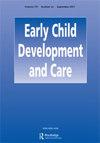Chinese young children’s work education under the impact of the global pandemic and digitalization
IF 1
4区 心理学
Q3 EDUCATION & EDUCATIONAL RESEARCH
引用次数: 0
Abstract
ABSTRACTWork education constitutes a unique element of early childhood education for Chinese young children. The COVID-19 pandemic and the associated school closures have forced children to study online, making work education almost impossible. This study aimed to examine the status quo and the profiles of early work education done by Chinese parents. 1564 Chinese parents with young children (aged 3–6 years) completed an online survey. Nine parents were interviewed. Findings indicated that: (1) parents scored the highest on resilience education, followed by responsibility and creativity; (2) three profiles of work education emerged: the least level, the medium level, the highest level; (3) there were significant effects of regions, household income, and educational levels; (4) the pandemic and digitalization rendered work education more intelligent, while also reducing children’s work practice in the outdoor; and (5) parents raised concerns about early digital addiction. Implications for early childhood education are also discussed.KEYWORDS: Early childhood work educationwork habits and characterdouble impact of the global pandemic and digitalizationdigital divide Disclosure statementNo potential conflict of interest was reported by the author(s).Additional informationFundingThis work was supported by National Social Science Fund of China: [Grant Number 22CSH039].Notes on contributorsCong WeiCong Wei is a lecturer at Shanghai Normal University, Shanghai, People's Republic of China. Her research interests include early work education, early digital education, digital child, rural education and policy.Xinji LiaoXinji Liao is a postgraduate at Shanghai Normal University, Shanghai, People's Republic of China. Her research interests include early work education and policy.Zhiyi LiZhiyi Li is a postgraduate at Shanghai Normal University, Shanghai, People's Republic of China. Her research interests include early work education, rural education and policy.Yanzhen YuYanzhen Yu is a lecturer at Shanghai Normal University, Shanghai, People's Republic of China. Her research interests include early digital education, teacher education and lifelong education.Luyao LiangLuyao Liang is sessional teaching staff at Macquarie School of Education, Macquarie University, Australia. His research interests include early bi/multilingual education, early language teacher education, health and wellbeing in early childhood.全球疫情和数字化冲击下的中国幼儿劳动教育
摘要劳动教育是我国幼儿早期教育的独特组成部分。COVID-19大流行和相关的学校关闭迫使儿童在线学习,使工作教育几乎不可能。本研究旨在了解中国父母早期工作教育的现状和概况。1564位有年幼子女(3-6岁)的中国父母完成了一项在线调查。9位家长接受了采访。结果表明:(1)家长在弹性教育中得分最高,其次是责任教育和创造力教育;(2)劳动教育呈现出最低水平、中等水平、最高水平三个层次;(3)地区、家庭收入和受教育程度的影响显著;(4)疫情和数字化使劳动教育更加智能化,同时也减少了儿童在户外的劳动实践;(5)家长们提出了对早期数字成瘾的担忧。对幼儿教育的影响也进行了讨论。关键词:幼儿工作教育工作习惯和特点全球流行病和数字化的双重影响数字鸿沟披露声明作者未报告潜在的利益冲突。项目资助:国家社科基金[批准号:22CSH039]。作者简介:丛伟,中华人民共和国上海师范大学讲师。主要研究方向为早期工作教育、早期数字教育、数字儿童、农村教育与政策。廖欣基,中国上海师范大学研究生。她的研究兴趣包括早期工作教育和政策。李志毅,上海师范大学研究生,中国上海。主要研究方向为早期劳动教育、农村教育与政策。余艳珍,上海师范大学讲师。主要研究方向为早期数字教育、教师教育和终身教育。Luyao Liang是澳大利亚麦考瑞大学麦考瑞教育学院的兼职教师。主要研究方向为早期双语/多语教育、早期语言教师教育、幼儿健康与福祉。
本文章由计算机程序翻译,如有差异,请以英文原文为准。
求助全文
约1分钟内获得全文
求助全文

 求助内容:
求助内容: 应助结果提醒方式:
应助结果提醒方式:


